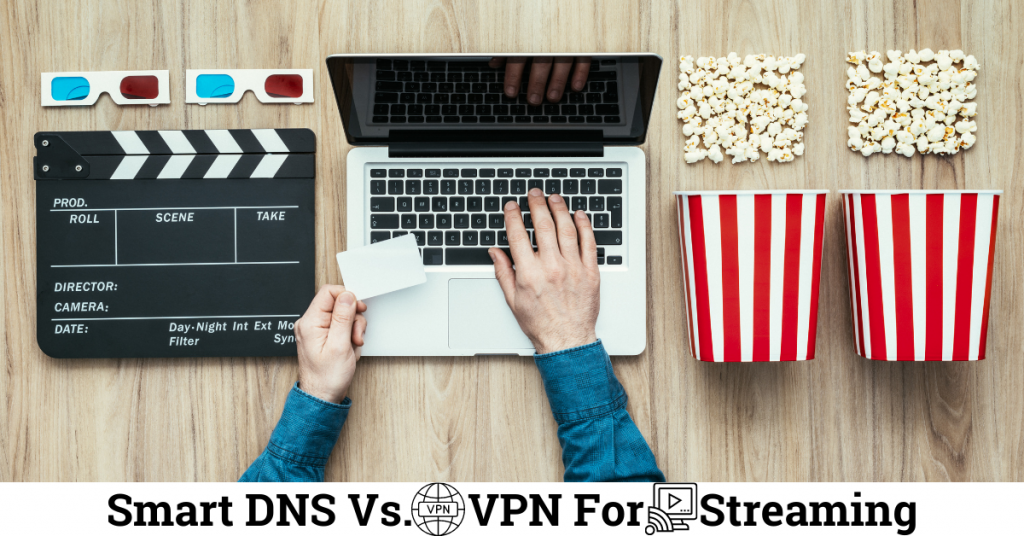As concerns over privacy in the digital age becomes more precarious and controversial, cybersecurity becomes a more complex matter. Whether someone is constantly plugged in or new to technology, maintaining their right to privacy is a serious concern.
The services that Smart DNS and VPN offer are not 1:1, making your choice between them critical. VPN can give you better protection and security, but will not be available on every device and will cost more.
Deciding which to choose from comes down mostly to personal preferences and what your needs are. Since streaming is very common, chances are you will need to choose carefully to maximize your satisfaction. Read on to understand the differences between Smart DNS and VPN, especially while streaming.

What Are Smart DNS and VPN?
For those unfamiliar with these terms, a quick overview of the two can help.
A Smart DNS filters your searches through a proxy server, which gathers the results and relays them back to the user. Some providers may encrypt your searches, but will not encrypt your data. When using a Smart DNS, your IP will not be changed, but your geo-location will.
A VPN encrypts your data and keeps your internet traffic protected from outside entities. Along with your data, your IP address is changed, making it harder for others to track or find you. These are key aspects to maintain a solid level of cybersecurity.
On the whole, VPN services certainly offer more than a Smart DNS, ensuring that users are better protected and have better privacy. If someone is willing to pay the extra money that VPN would charge, then they can enjoy the advantages it affords over a Smart DNS.
It may go without saying, but picking either of these options for free is far from optimal, as any worthwhile service will have you spending at least some money. On the plus side, you may be able to fine a bundle that offers both if you are interested.

What To Look For When Streaming
In order to evaluate how each service does during streaming, it is important to understand what to look for. To find out which can provide the superior service, the following are good aspects to look at:
- Speed: which can run higher network speeds,
- Availability: which can be used on more devices,
- Price: which is cheaper,
- Difficulty: which is easier to use,
- Blocked content: sometimes, streaming services will make certain movies or shows available to watch in certain countries, blocking it from the rest of the world. The aim here is for Smart DNS or VPN to work around this and give you access to the content,
- IP Address: which keeps your IP protected, allowing you to stream without being tracked,
- Encryption: which encrypts your data and traffic, offering more security.
While it is true that some people may ignore one or two of these aspects, this is still a solid estimate of what consumers look for. With these in mind, it is time to look at how Smart DNS and VPN operate while streaming.
What Does Smart DNS Offer For Streaming?
Using Smart DNS can be very useful while on streaming services, allowing you to access content otherwise blocked by your location. Since it goes through minimal servers, streaming is faster than it would be on a VPN. It can also be used on many devices, including those without access to VPN services.
However, there are drawbacks to Smart DNS, namely its lack of encryption or hiding your IP address. Setting up a Smart DNS can also be complicated and at times be nearly as expensive as VPNs without the extra services.
What Does VPN Offer For Streaming?
On the whole, VPN comes with more features that can protect someone by fully encrypting their data and changing their IP address. This means that they can stream all they want without it being monitored and bypass location constrictions on content. Setting up a VPN is also a very simple process that can be turned on and off easily.
Working against the claim in favor of using VPN is the fact that it is often more expensive than DNS services and is not always on a specific device. Also, the extra work that a VPN goes through to protect you means that the streaming will be slower.

Which Provides the Better Service?
Figuring out which you want depends on what you specifically need, as both offer an edge over the other. Smart DNS can be accessed on more devices and is generally cheaper than VPN. It is also faster than VPN, as the process it goes through is simpler.
However, these do come at a price, as VPN offers more once you have it. VPN earns its higher price, as it encrypts your data and changes your IP when in use. This is especially helpful when torrenting copyrighted materials. On top of that, a VPN is also easier to set up.
Before you make a decision, you will have to decide what you value most for your own needs. If you need the security and protection that VPN offers, then there is no contest between the two. In terms of cybersecurity, VPN is the clear winner.
At the same time, if you plan to use many different devices, you will want to check if VPN is available on them all. If not, then a DNS may be your only option. The same goes if you have to choose under a budget.
Conclusion
Streaming has become a popular online activity that most people do, whether it be on torrent websites or Netflix. At the same time, concerns over cybersecurity are at an all-time high, increasing the demand for better protection of data and personal information. This makes it tricky to decide between Smart DNS and VPN.
If your main preference is cybersecurity, VPN is the way to go, as it keeps you protected and hidden. Other than that, Smart DNS is cheaper, more available, and faster, making it attractive to someone with more casual preferences.

Recent Comments